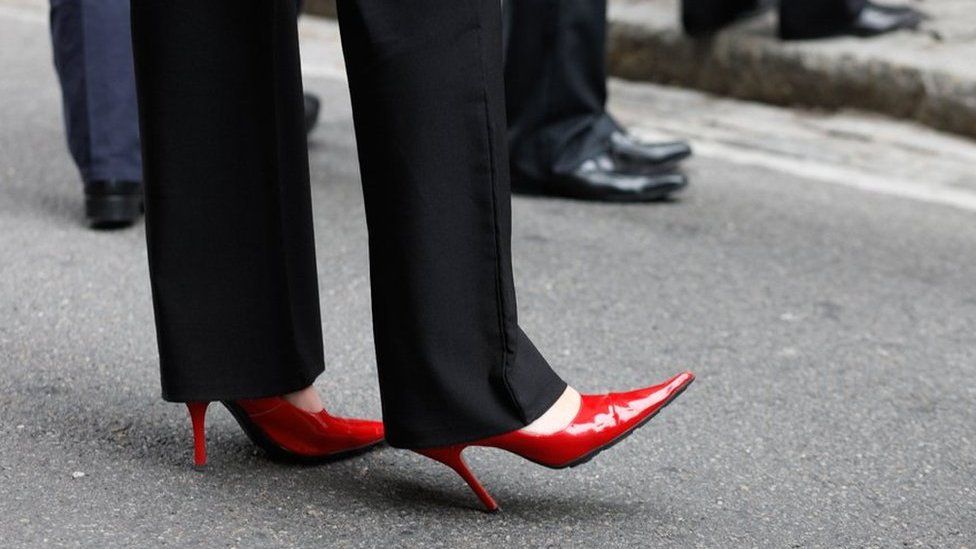Is it legal to force women to wear high heels at work?
- Published

A 27-year-old woman working for a City firm in London says she was sent home for refusing to wear high heels. But is this legal, fair or healthy?
Nicola Thorp says she was laughed at when she told her bosses that she didn't want to wear high heels on her first day as a corporate receptionist.
"I was expected to do a nine-hour shift on my feet escorting clients to meeting rooms. I said I just won't be able to do that in heels," she told the BBC.
She had arrived at the accountancy firm PwC wearing flats and she says she was told to go home without pay unless she went out and bought heels that were between two and four inches high. She refused and alleges Portico - the firm that runs PwC's reception at its office in Embankment, central London - followed through with its threat.
Now Thorp has set up a petition to the government, demanding "women have the option to wear flat formal shoes at work". It has picked up more than 7,000 signatures. The petition says the law as it stands is "outdated and sexist".
UK employers can dismiss staff who fail to live up to "reasonable" dress code demands, says employment law firm Thompsons, as long as they've been given enough time to buy the right shoes and clothes. They can set up different codes for men and women, as long as there's an "equivalent level of smartness".
But a dress code including high heels "reeks of sexism", says Frances O'Grady, general secretary of the TUC. "High heels should be a choice, not a requirement."
So, could women made to wear them at work sue their employer? "If they set the code because they thought high heels made women look sexy, that is a case," says Lawrence Davis, director at Equal Justice Limited solicitors, "because being sexy at work is not a job requirement."
Then there are health concerns. "From the point of view of the foot high heels are a disaster," said Tony Redmond, a biomechanics expert at Leeds University. "The joints of the feet can be damaged by wearing high heels, and this can cause some forms of arthritis."
He also warned that regularly wearing heels increases the mechanical wear and tear around the knee joints, which might increase the risk of osteoarthritis. It also puts people with weak lower backs at risk of slipped vertebrae.
Nicola Thorp said she was laughed at for asking if male colleagues were also expected to wear heels
The College of Podiatry has warned employers not to make women wear high heels at work because they can cause bunions, back problems, ankle sprains and tight calves. It has been worked out that it takes an average of one hour, six minutes and 48 seconds for them to start hurting.
That's a worry for women who are on their feet for several hours a day. Emma Supple, a podiatrist from the College of Podiatry, says the high-heel issue affects a number of industries. She had a number of female cabin crew who came to her with clinical issues from wearing high heels at work. She suggested a change of footwear but was told staff would not be allowed to wear them.
"I spoke in the House of Commons about this, and it really opened some eyes to the issue. This led to a TUC motion in 2009 that women shouldn't be forced to wear high heels.
"All companies should be mindful of both the comfort as well as the smartness of their employees. These are not incompatible."
Photos of the bloodied feet of a waitress in Canada - who worked a full shift in high heels, part of the company's dress code - have been shared more than 10,000 times on Facebook.
Last year, the Israeli airline El Al established a rule that all female cabin crew had to wear high heels until all passengers were seated.
Simon Pratt, managing director at Portico, said Thorp had reported to work with "inappropriate footwear", saying she had "previously signed the appearance guidelines". He adds that such guidelines were "common practice within the service sector" but the company were now reviewing them. PwC says it's in discussions about Portico's policies. The incident involving Thorp happened last December. She started the petition this week.
It has received more than 20,000 signatures, meaning the government must give a comment. If it gets 100,000, there's a chance MPs could debate in Parliament whether women should have to wear high heels at work.
How can I stop high heels damaging my body?
Surgeon Gabriel Weston reveals how to prevent your shoes causing you harm. Check out the iWonder guide
Subscribe to the BBC News Magazine's email newsletter to get articles sent to your inbox.